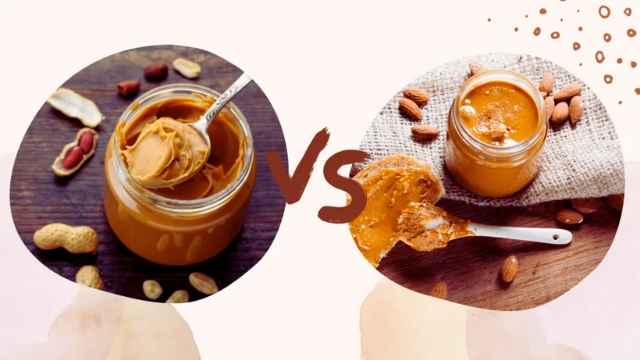Peanut Butter vs Almond Butter: Which One Helps More With Weight Loss?

Nut butters have become a kitchen staple for many people, especially those who are focused on healthy eating. They’re creamy, delicious, easy to add to meals, and packed with nutrients. While peanut butter has long been a popular favorite, almond butter is gaining attention for its unique health benefits.
Both can give your body a quick protein boost, but they have differences when it comes to nutritional value. If you’re trying to pick the better option for weight loss, this article will help you compare the two in terms of protein, fibre, healthy fats, and more.
Let’s break it down to see which one really supports your weight loss goals better.
Protein Content
Protein is important for building muscles, staying full, and maintaining energy levels — especially when you’re trying to lose weight. Both peanut butter and almond butter are good plant-based sources of protein, but peanut butter usually has the edge in this category.
In general, two tablespoons of peanut butter contain about 7 to 8 grams of protein, while the same amount of almond butter provides around 6 to 7 grams. This small difference may not seem like much, but for those specifically tracking protein intake — like athletes or people on high-protein diets — it might matter.
That said, while peanut butter has slightly more protein, it’s still essential to look at the full nutrition picture, not just the protein numbers.
Vitamins, Minerals, and Other Nutrients
Both types of nut butter come with a variety of vitamins and minerals that support overall health. But when you look closely, almond butter is the winner in terms of nutrient density.
Peanut butter offers some valuable nutrients like:
-
Vitamin E
-
B vitamins
-
Folate
-
Magnesium
-
Healthy fats
However, almond butter outshines peanut butter in several key areas:
-
It contains three times more vitamin E, which supports skin and immune health.
-
It has twice as much iron, important for energy and red blood cell production.
-
It offers seven times more calcium, which helps with bone strength.
-
It’s richer in monounsaturated fats, which are known to support heart health and reduce inflammation.
Both butters also contain useful amounts of potassium, zinc, biotin, and magnesium — nutrients that help regulate metabolism, support nerve function, and boost immunity. But overall, almond butter gives you more of these health-promoting nutrients in each serving.
Fibre Content
Fibre is a major factor when it comes to weight loss. It keeps you feeling full longer, reduces cravings, and helps keep your digestive system running smoothly.
Here again, almond butter has the advantage. It contains more fibre per serving than peanut butter. This means when you eat almond butter, you’re more likely to feel satisfied and less likely to reach for extra snacks. The extra fibre also slows down digestion, helping to stabilize your blood sugar and energy levels throughout the day — a key benefit when trying to manage hunger and avoid overeating.
Calories and Sugar
When it comes to calories, both nut butters are considered calorie-dense. That means they pack a lot of energy into a small serving size — around 190 to 200 calories per two tablespoons. This is similar for both almond and peanut butter.
In terms of sugar, natural versions of both butters are fairly low in sugar. The catch is that some commercial brands add sugar, salt, and oils to enhance flavor and texture. This can reduce the health value of the product, especially for people watching their sugar intake.
Tip: Always read the label. Look for versions that list just one or two ingredients — usually the nuts themselves and maybe a touch of salt. Avoid added sugars and hydrogenated oils whenever possible.
Which One Is Better for Weight Loss?
Now that we’ve broken down the key nutrients, which nut butter is actually better for weight loss?
The answer depends on your priorities, but almond butter may offer a slight edge thanks to its higher fibre content and more healthy fats, which help you stay full longer and curb cravings. The extra vitamins and minerals also support your body during calorie reduction, which is important for long-term weight loss.
However, peanut butter is still a good option. It offers more protein, which can also help you feel satisfied and maintain muscle mass during weight loss. Plus, it’s often more budget-friendly and easier to find in stores.
Which One Should You Choose?
From a nutritional point of view, almond butter is slightly better than peanut butter due to its higher fibre, calcium, iron, and heart-healthy fat content. That said, peanut butter is still very nutritious and provides more protein, which can also aid in weight control.
Ultimately, the better choice comes down to your goals and personal preferences:
-
If you want more protein and an affordable, classic spread — go with peanut butter.
-
If you’re looking for a more nutrient-rich option that supports fullness and heart health — try almond butter.
-
If you enjoy both and want variety in your diet, consider rotating between them.
Whichever you pick, just remember to stick to natural, no-added-sugar versions and keep an eye on portion sizes. A little goes a long way — and when used wisely, both can be part of a healthy, balanced diet that supports weight loss.